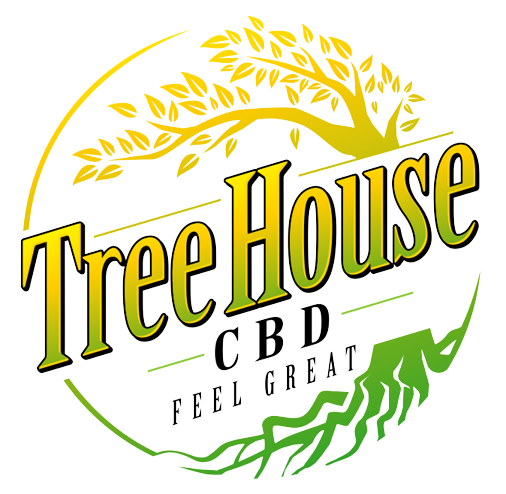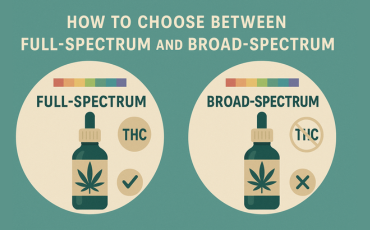When exploring CBD products, one of the most important decisions you'll face is choosing between full-spectrum and broad-spectrum CBD oil. While Full-Spectrum vs Broad-Spectrum CBD Oil Explained may seem like a complex topic, understanding these differences is crucial for selecting the right product for your needs. Both types offer unique benefits, but they work differently in your body and may suit different lifestyles and preferences.
Understanding CBD Oil Basics
CBD, or cannabidiol, is a non-psychoactive compound derived from the cannabis plant that has gained significant popularity for its potential therapeutic benefits. Unlike THC, CBD doesn't produce a "high" feeling, making it an appealing option for those seeking natural wellness solutions without mind-altering effects.
The key difference between full-spectrum and broad-spectrum CBD lies in their chemical composition and how the compounds within each type work together to potentially enhance therapeutic effects.
What Is Full-Spectrum CBD Oil?
Full-spectrum CBD oil contains all naturally occurring compounds found in the cannabis plant. This includes not only CBD but also other cannabinoids such as CBG, CBN, and trace amounts of THC (legally limited to 0.3% or less), along with terpenes, flavonoids, and essential oils.
The Entourage Effect
The defining characteristic of full-spectrum CBD is the "entourage effect" – a theory suggesting that all cannabis compounds work synergistically to enhance each other's therapeutic benefits. This means the combined effect of all compounds may be greater than the sum of their individual effects.
Benefits of Full-Spectrum CBD
• Enhanced therapeutic potential due to the complete range of plant compounds
• Broader spectrum of potential benefits from multiple cannabinoids working together
• Natural plant profile maintains the original cannabis composition
• Research support for the entourage effect in various studies
Potential Drawbacks
• Contains trace THC which may show up on sensitive drug tests
• Stronger cannabis taste due to full terpene profile
• May not be suitable for those avoiding any THC content
What Is Broad-Spectrum CBD Oil?
Broad-spectrum CBD oil undergoes an additional refinement process to remove THC while preserving other beneficial compounds like minor cannabinoids, terpenes, and flavonoids. This creates a middle ground between full-spectrum and CBD isolate products.
Modified Entourage Effect
While broad-spectrum doesn't include THC, it still offers a modified version of the entourage effect through the interaction of CBD with other cannabinoids and terpenes present in the oil.
Benefits of Broad-Spectrum CBD
• Zero THC content eliminates drug test concerns
• Retains beneficial compounds like minor cannabinoids and terpenes
• Milder taste profile with reduced cannabis flavor
• Suitable for sensitive users who want to avoid THC entirely
Potential Limitations
• May be less effective than full-spectrum for some individuals
• Missing potential THC benefits that contribute to the entourage effect
• Additional processing required to remove THC
Key Differences at a Glance
THC Content:
• Full-spectrum: Up to 0.3% THC
• Broad-spectrum: 0% THC
Entourage Effect:
• Full-spectrum: Complete entourage effect with all plant compounds
• Broad-spectrum: Modified entourage effect without THC
Drug Testing:
• Full-spectrum: Small possibility of positive results with extremely sensitive tests
• Broad-spectrum: No risk of THC-related positive tests
Taste Profile:
• Full-spectrum: Stronger cannabis flavor
• Broad-spectrum: Milder, less pronounced taste
How to Choose Between Full-Spectrum and Broad-Spectrum
Consider Full-Spectrum If You:
• Want maximum therapeutic potential from the complete entourage effect
• Are not subject to drug testing requirements
• Don't mind the natural cannabis taste
• Are seeking comprehensive wellness support
• Have experience with cannabis compounds
Consider Broad-Spectrum If You:
• Need to avoid THC completely for employment or personal reasons
• Are new to CBD and prefer a cautious approach
• Are sensitive to THC or have concerns about psychoactive effects
• Prefer a milder taste profile
• Want cannabinoid benefits without THC risks
Manufacturing and Quality Considerations
Both full-spectrum and broad-spectrum CBD oils typically use CO2 extraction methods to preserve beneficial compounds. The key difference lies in the additional chromatography process used for broad-spectrum products to selectively remove THC while maintaining other cannabinoids.
Third-Party Lab Testing
Regardless of which type you choose, always verify that products include Certificates of Analysis (COAs) from independent laboratories. These tests confirm:
• Potency levels of CBD and other cannabinoids
• THC content verification
• Absence of contaminants like pesticides, heavy metals, and residual solvents
• Microbial safety testing for molds and bacteria
Legal and Safety Considerations
Both full-spectrum and broad-spectrum CBD oils derived from hemp with less than 0.3% THC are federally legal under the 2018 Farm Bill. However, state regulations may vary, so check local laws before purchasing.
Potential Side Effects
Common mild side effects for both types may include:
• Dry mouth
• Drowsiness or fatigue
• Changes in appetite
• Digestive upset
Always consult with healthcare providers before starting any CBD regimen, especially if you take medications or have underlying health conditions.
Making Your Decision
The choice between full-spectrum and broad-spectrum CBD ultimately depends on your individual needs, lifestyle, and preferences. Consider starting with a broad-spectrum product if you're new to CBD or have concerns about THC, then potentially transitioning to full-spectrum if you want to explore the complete entourage effect.
Remember that everyone responds differently to CBD, and what works best for one person may not be ideal for another. Start with lower doses regardless of which type you choose, and gradually increase as needed while monitoring your body's response.
Conclusion
Understanding Full-Spectrum vs Broad-Spectrum CBD Oil Explained empowers you to make informed decisions about your wellness journey. Both options offer unique advantages – full-spectrum provides the complete entourage effect with trace THC, while broad-spectrum delivers cannabinoid benefits without any THC content.
Consider your specific needs, lifestyle requirements, and comfort level when making your choice. Whether you select full-spectrum for maximum therapeutic potential or broad-spectrum for THC-free peace of mind, ensure you purchase from reputable companies that provide comprehensive third-party lab testing and transparent ingredient information.
Ready to explore high-quality CBD options? Research reputable brands that offer both full-spectrum and broad-spectrum products, review their lab testing protocols, and consult with healthcare professionals to determine the best approach for your individual wellness goals.


